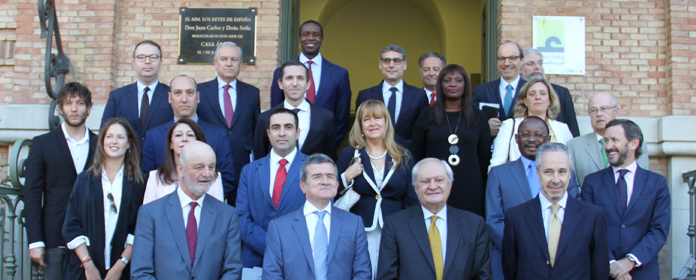A hundred attendees, businessmen and representatives of Spanish public institutions participate in the event 'Africa, a present with a future'.
The activity, co-organized by the NCID of Institute for Culture and Society together with the Ministry of Foreign Affairs, emphasized that the continent has great potential to develop business ideas.

PHOTO: José Manuel Cuevas
Africa is not one, but many realities, and ignoring the potential of a continent just 14 kilometers from the Spanish coast would be a mistake. That was the main conclusion of the event Africa, a present with a future organized by the Ministry of Foreign Affairs, European Union and Cooperation of the Government of Spain in conjunction with the Navarra Center for International Development (NCID), research center of the Institute for Culture and Society of the University of Navarra.
The event was held last Thursday, May 30 at Casa Árabe in Madrid and brought together a dozen speakers, as well as a hundred attendees, businessmen and representatives of Spanish public institutions, to make an x-ray of the different trends in African countries. It was chaired by the Secretary of State for Foreign Affairs, Fernando Valenzuela, who emphasized the Spanish Government's commitment to change the way the country looks at the African continent.
position The opening lecture was given by Stefan Dercon, director of the Center for programs of study of African Economies at Oxford University, who wanted to break the dogmas of interventionism or liberalism in his inaugural lecture . "A mature state is one that knows what it can and cannot do. Policies that are truly poverty-reducing go beyond the state vs. free-market perspective," said Dercon.
He was followed by three round tables. The first, on the strength of institutions and governance, was opened by Ramón Gil-Casares, Spanish Ambassador to Egypt. He emphasized the need to support the youth: "Violent changes have never worked, we must support the youth. The age average in Sub-Saharan Africa is 20 years old and that of the leaders is 62 years old. This cannot be", stressed Gil-Casares.
The second roundtable highlighted the migrations between African countries and the reality of the shift from living in rural areas to cities. The city of Lagos in Nigeria already has 22 million people and the danger of cities filling up and not having the capacity to absorb the population demand is real. The director of the World Bank's Center for Mediterranean Integration, Blanca Moreno-Dodson, pointed out that "the solution is to develop the rural area, not everyone should go to the cities, because it would also damage the environment".
Likewise, Carlos Reyes, head of African funds at the World Bank's private finance department, stressed the importance of sustainable investment and the impact on opportunities, as well as the opportunity for Spanish companies of the demographic boom. "That more children are growing up in Nigeria than in all of Western Europe is important. If I am a diaper business like Dodot, I will have to keep an eye on that," he said.
The last roundtable brought together entrepreneurs from different fields to discuss business opportunities in Africa. BDK Group's executive director , Vasco Duarte-Silva, highlighted the diversity on the continent. "Talking about African bonds is like if I ask you if you invest in European bonds: Greek or German? Because they are not the same. Talking about Africa as a country makes me panic, because it is a much richer continent culturally than Europe," said Duarte-Silva.
With an age average of 18 years in sub-Saharan Africa, a young, educated and increasingly urbanized population, the challenges presented by the continent are enormous, but even more so are the opportunities and market niches in which Spanish companies can participate. Why not, starting, for example, with diapers.




